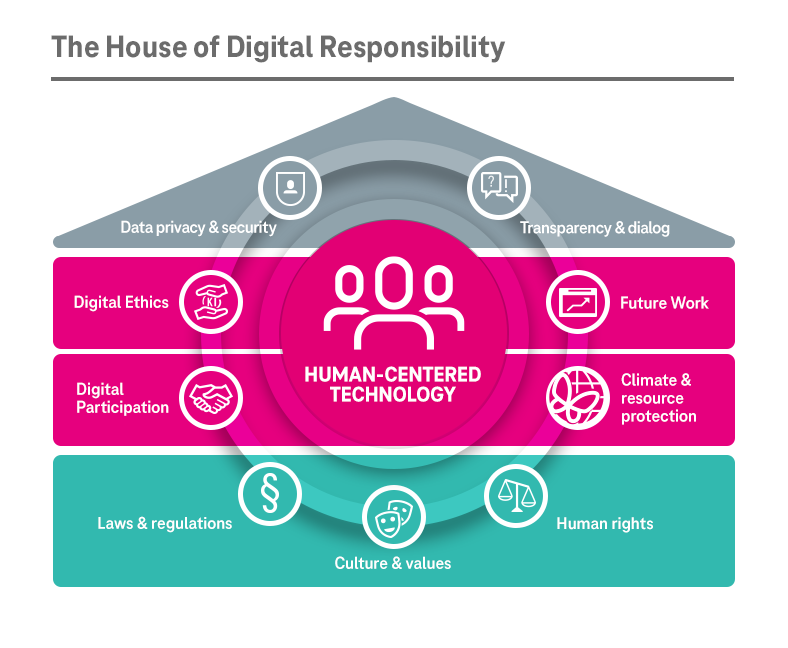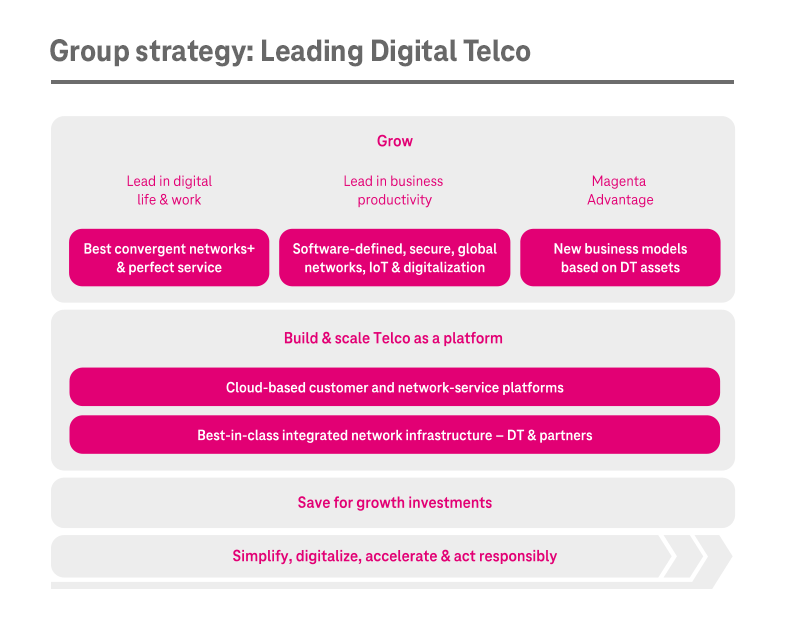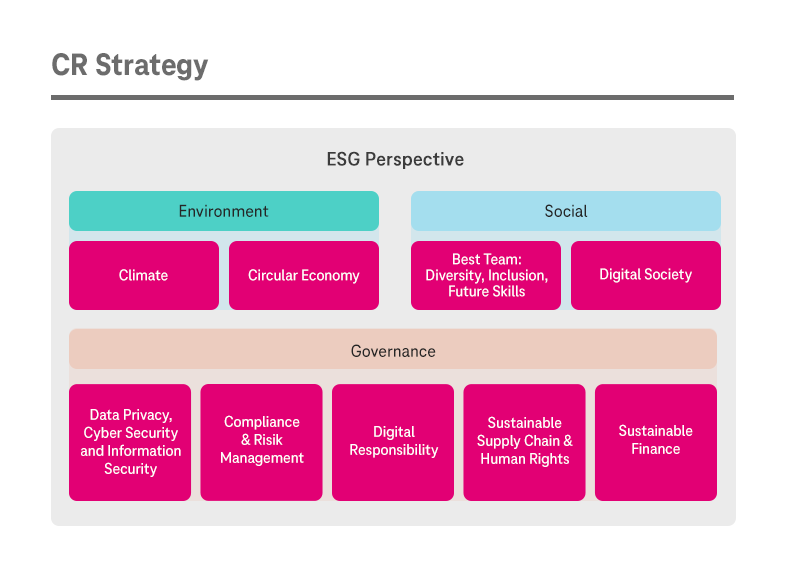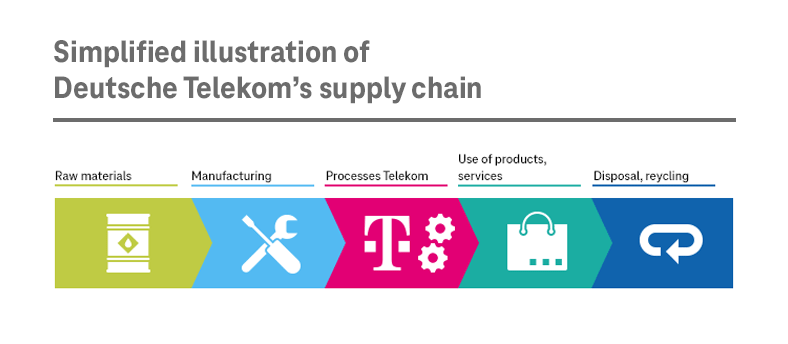Day in and day out, we see our world changing, at ever-faster rates. Computers, smartphones, and artificial intelligence (AI) now play indispensable roles in our daily lives. Most of the time, they help us without our even noticing their operation. All of this is the beginning of a development that we can no longer stop – and that we don’t want to stop. All enthusiasm notwithstanding, however, we shouldn’t head into the digital future blindly. As we move forward, we should seek to define a clear direction and a binding framework for that future. We at Deutsche Telekom are working to bring about digitalization oriented toward people and values. “Corporate digital responsibility” (CDR) refers to efforts to manage the opportunities and risks of the digital transformation responsibly. The goals of our CDR activities are twofold: to prevent negative impacts, and to help shape the digitalization process in a positive way.
Throughout our CDR work, we take great care to ensure that all processing of our customers’ personal data is carried out transparently and responsibly, in ways that also safeguard individual customers’ privacy and security. Further information about this area is available in our publications on data privacy, in our status report on data privacy, and in our transparency report. Also, in our Digital Ethics Guidelines on AI, we describe our responsible use of AI in connection with our products and services.
Digital participation is a core aspect of our commitment. We are working to ensure that all people have equal opportunity to be a part of the digital society. Our focuses in this regard include the technical aspects of broadband access, rates and devices that are affordable for all budgets, and users’ ability and desire to use digital media competently. For example, we carry out a variety of projects and implement measures to promote media literacy and democracy skills among the population.
Upholding of human rights is a key element of responsible digitalization. We strive always to protect and respect human rights in regard to the responsibilities that emerge as a result of technological change and the digital transformation. Our objective is for our technology to be implemented on the basis of humanitarian values. We have also anchored the principle of digital responsibility and participation in our Code of Human Rights, which we updated in 2023. This code applies not only to our company, but also to our business partners – and to our approximately 20 000 suppliers in over 150 countries. We expressly require our suppliers to join us in our responsibility, with a view to ensuring that human rights are also respected within the sphere of influence that we have outside of our Group.
Digital responsibility  is also highly important with regard to environmental and climate-protection issues. By developing products that are innovative and sustainable, we help our customers reduce their own carbon footprints – and thereby contribute to climate protection. In addition, to help our customers find sustainable solutions, we highlight products and services that are environmentally and climate friendly. We do this with our TÜV-verified #GreenMagenta Label (for products and services) and our Eco Rating scheme (for mobile devices). Our “Smart Innovations” also contribute to society’s efforts to improve its ecological balance.
is also highly important with regard to environmental and climate-protection issues. By developing products that are innovative and sustainable, we help our customers reduce their own carbon footprints – and thereby contribute to climate protection. In addition, to help our customers find sustainable solutions, we highlight products and services that are environmentally and climate friendly. We do this with our TÜV-verified #GreenMagenta Label (for products and services) and our Eco Rating scheme (for mobile devices). Our “Smart Innovations” also contribute to society’s efforts to improve its ecological balance.
Digitalization is opening up new ways and possibilities for working. We are helping to shape the digital transformation in the workplace, in a responsible manner, and we are continuing to support our employees in addressing the challenges the transformation has brought. We are reinforcing our employees’ digital skills with a range of measures, including the WeLearn training initiative and the Percipio and “Learning from experts” (LEX) training packages. In addition, in close consultation with our Group Works Council, we have adopted a “Manifesto on Agile  Working,” a set of guidelines for the digital workplace.
Working,” a set of guidelines for the digital workplace.
Our definition of digital responsibility
Technological development must be based on values. We see ourselves as having a responsibility to implement ethics within technologies and to make technologies accessible to everyone. In 2022, we published our Corporate Digital Responsibility@Deutsche Telekom framework, which summarizes our views of digital responsibility. We make people the priority. The centerpiece of the framework is our House of Digital Responsibility, which is all about people-centric technology.

Our CDR framework and our House of Digital Responsibility are both based on our guiding principles. The foundation of this basis is the commitment to act in accordance with laws and regulations, with human rights, and with basic values such as cultural values. Conceptually, we place a number of key areas on this foundation – digital ethics, digital participation, the future of work, and climate protection and resources conservation. These key areas serve as orientational aids for our activities. The foundation and all of these areas, in turn, are housed under the umbrella of principles that constantly guide our efforts, namely data privacy and security, and transparency and dialog.
Outside of our own corporate sphere, our efforts and commitments in this area include active involvement in various alliances and partnerships, such as the BVDW (German Association for the Digital Economy), econsense, a network of internationally operating companies, and the Charta für digitale Vernetzung (Digital networking charter; only available in German). In addition, we are a member of the Corporate Digital Responsibility initiative of the German Federal Ministry of Justice. In 2021, we signed the Initiative’s CDR Codex, thereby committing ourselves to observe a set of concrete principles and to regularly publish a relevant progress report. We published this report for the reporting year in July 2023.






